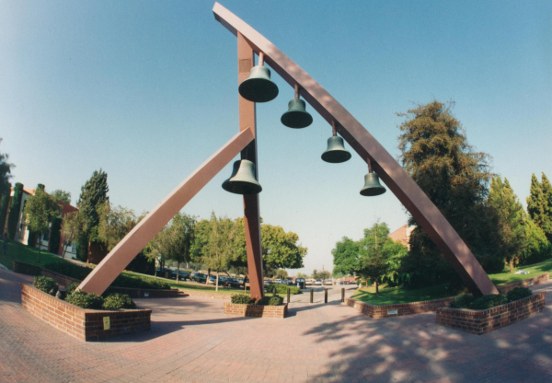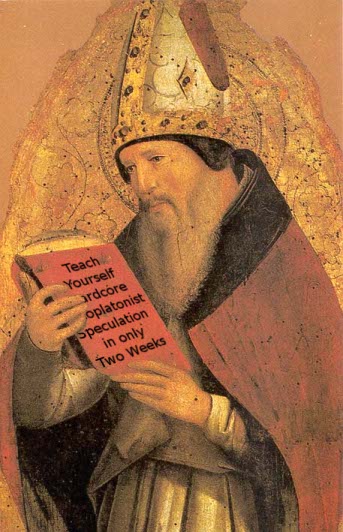Evolution of the Trinity – with Bill Schlegel
A narrative of the series of early speculations that eventually led to the idea of the Trinity as the one God.
A narrative of the series of early speculations that eventually led to the idea of the Trinity as the one God.
How can they respond to an argument which shows that they collapse the Father/Son distinction?
In my recent paper on the Trinity (discussed by Dale and I here and here) I distinguish two ways a thing can meet sufficient conditions of personhood. One way is to behave, function, or perform in such a way as to meet those conditions. So if a robot or group, for example, became morally responsible or rational in virtue of function alone, it would thereby… Read More »Yet More Theories of the Trinity
H/T Oliver Crisp on Facebook. From the fun theologygrams. Seems there is no rest for the weary. Only one way out: a big, comfortable, ground-hugging, smokescreen of mystery. Make it really big, wait till it spreads, and then make your getaway, before it dissipates. Quickly!
Our fictional story was necessary, to help us think about some important distinctions about referring terms. It is easy to forget that “Trinity” was once a puppy, a neologism. But it was. It was born some time in the second half of the second century. We don’t know who coined it, but the earliest surviving mention of it is by Theophilus, bishop of Antioch (d.… Read More »Flocanrib and the ambiguity of the word “Trinity”
 Over at Biola’s alumni magazine, Winter 2011 issue, theologian Fred Sanders has a piece in which he argues,
Over at Biola’s alumni magazine, Winter 2011 issue, theologian Fred Sanders has a piece in which he argues,
The Trinity is a biblical doctrine, but let’s admit it: There’s something annoying about how hard it is to put your finger on a verse that states the whole doctrine.
The Bible presents the elements of the doctrine in numerous passages, of course: that there is only one God; that the Father is God; that the Son is God; and that the Spirit is God. We can also tell easily enough that the Father, Son and Spirit are really distinct from one another, and are not just three names for one person. If you hold all those clear teachings of Scripture in your mind at one time and think through them together, the doctrine of the Trinity is inevitable. Trinitarianism is a biblical doctrine and all the ingredients are given to us there: Just add thought and you have the classic doctrine. (emphases added)
Hmmm…. I would have thought that the elements of “the” doctrine included that the three are same substance or essence (homoousios). And that the there are co-equal, and co-eternal, uncreated, though the Father timelessly generates the Son, and the Spirit proceeds from him (or if you’re Western/Latin – from both Father and Son). Maybe something about their having one “divine nature” as well.Read More »No “Trinity Verse” – A Good Thing?
 Three World Vision employees are fired because according to World Vision they don’t believe in that Jesus is “fully God” or that he’s a member of the Trinity.
Three World Vision employees are fired because according to World Vision they don’t believe in that Jesus is “fully God” or that he’s a member of the Trinity.
But inquiring minds want to know: what did they believe, what statement or statements of faith did they sign, and are the beliefs therein necessary and sufficient for being a real Christian? This time, we’re digging a little deeper.
Their website saith,
World Vision U.S. hires only those who agree and accept to its Statement of Faith and/or the Apostles’ Creed. (source)
Interesting! Note the “and/or” – employees must affirm either one or both. As we’ve noted before here at trinities, nothing in the so-called Apostles’ Creed requires belief in either the “full deity” of Christ (whatever that may mean) or any sort of trinitarian theory.Read More »No Trinity, No Job – Part 2
 The latest Christianity Today magazine features an article entitle “Faith-Based Fracas”, by free-lance reporter Bobby Ross Jr. The main interest of the piece is whether or not it will remain legal for religious organizations to hire and fire on the basis of religious beliefs.
The latest Christianity Today magazine features an article entitle “Faith-Based Fracas”, by free-lance reporter Bobby Ross Jr. The main interest of the piece is whether or not it will remain legal for religious organizations to hire and fire on the basis of religious beliefs.
For the record: I support that right.
But the piece is occasioned by a current lawsuit against evangelical charity World Vision brought by three recently fired employees.
It strikes me that there are human and theological angles to this story which have yet to be told.
Here are the relevant bits from Ross’s story in CT:
Both [Sylvia Spencer and Vicki Hulse] signed statements affirming their Christian faith and devoted a decade to World Vision… But in November 2006, they and colleague Ted Youngerberg were fired. Their offense, as determined by a corporate investigation: The three did not believe that Jesus Christ is fully God and a member of the Trinity. (Bobby Ross Jr., “Faith-Based Fracas”, Christianity Today, June 2010, 17-21, p. 17, emphases added)
No doubt the reporter here was hindered by the fact that a lawsuit is underway. But the story has many obvious, yawning gaps:Read More »No Trinity, No Job – Part 1
Little known fact: overwork causes one’s neck to become invisible! After an embarrassing amount of time, I’ve finally finished my encyclopedia entry on the Trinity for the Stanford Encyclopedia of Philosophy (as well as lengthy supplementary documents on the history of Trinity doctrines, Judaic and Islamic objections, and unitarianism). Since I can’t thank them in the entry, I’d like to thank editors Ed Zalta and… Read More »“Trinity” @ the Stanford Encyclopedia of Philosophy
He’s baaaaack. A smokier, bluesier, dirtier “Trinity Schminity”. Now in basement music video form! Apparently there’s been some big shakeup in the band. Their website says “we are now a Christian father and son band”. Mother and daughter, we hardly knew ye. 🙁 Thankfully, they’re still “100% monotheist”. And they still ROCK. Get it? Winter has made himself a phony Trinity. “Bobo” and “Hayseed” are… Read More »Trinity Schminity – the music video
The traditional Christian doctrine of the Trinity is commonly expressed as the claim that the one God “exists as” Father, Son, and Holy Spirit, or as the claim that there are three divine persons “in” God, or as the claim that God “exists in three Persons”. I have to say: this drives me nuts. The “exists as” formula strongly suggests modalism, the idea that Father,… Read More »“the” Trinity doctrine – Part 1
Is my definition of the concept unitarian so wide that it would allow in some famous trinitarians?
Been tinkering under the hood… Try out the search bar here at trinities – upper right. Cool, huh? In other news, I have finally given into the Twitter thing. Want to follow me? Posts here also automatically go out to Tumblr and Facebook. All that social media jazz is now in buttons to the right of each post. (“Follow on…”) Similar icons, but different than: the new share… Read More »a few updates to trinities
I discuss mystery-epistemology and Bible interpretation with James and Andrew at City of God. And Scott (previous trinities posts) goes to town on Augustine, Henry of Ghent, and John Duns Scotus at Per Caritatem, where they’re having a Augustine Blog Conference.

Blame a lot of MMM on this guy – the Hip’ster.
I feel some need to explain and justify what is going on here, as I have divided loyalties.
On the one hand, the stated purpose of the blog is to make recent research on trinitarian theories available to the wider public, in relatively brief, understandable, jargon free form.
On the other hand, this blog’s most faithful readers and commenters are specialists in medieval philosophy & theology, or in recent analytic philosophy of religion, and they can really get into dialogging in the way that PhDs (and to-be-PhDs) in these fields do – which is to say – highly abstract, jargon filled, argument-heavy discourse, that only a scholar can love. Being a scholar, of course, I love it, and have no desire to stem their exploration of historic trinitarian theories. They are all, in various ways, doing cutting edge work, and I learn a lot by listening in, and by joining in. And I know that other philosophy profs appreciate these discussions as well.
My solution? Have it both ways. 🙂 I just want to try to build a bridge for non-academic readers, to help them, maybe, be able to get something out of this recent Medieval Metaphysical Mayhem (MMM). So I’m going to try to give some relevant background information.
Here goes: Read More »MMM unleashed @ trinities
Synopsis: I’m not Eastern Orthodox, so am incompetent to discuss the Trinity, and I’m somehow missing the whole point.